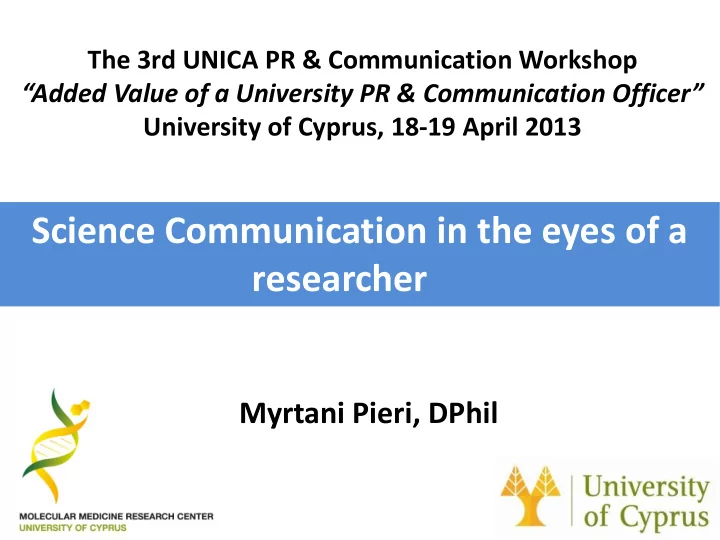

The 3rd UNICA PR & Communication Workshop “Added Value of a University PR & Communication Officer” University of Cyprus, 18-19 April 2013 Science Communication in the eyes of a researcher Myrtani Pieri, DPhil
“Nothing in science has any value to society if it is not communicated, and scientists are beginning to learn their social obligations” Anne Roe, The Making of a Scientist (1953)
“We need to apply the science of communication to the communication of Science” Preston Manning
Molecular Medicine Research Center MMRC Molecular Biology/Genetics 2011: Structural Funds EU for creation and maintenance of the first BIOBANK in Cyprus Promoted by the PR and Com. office of UCY through: Press conferences, press releases, television coverage in news Cypriot citizens, both patients and healthy individuals, visit the center and offer genetic material to be used for research
Science Communication-Famelab Science Communication FAMELAB COMPETITION 2011
Science Communication Communication is at the heart of science, both in making claims to new knowledge and then in transmitting the body of knowledge to both Scientists and non-Scientists.
Types of Science Communication “Professional” Science Communication Scientist to Scientist “Popular” Science Communication Scientist to non-specialized audience
Professional Science Communication Presenting your data in Conferences Writing scientific papers Oral presentation Poster presentation Scientific Paper
What the University PR & Communication office could do for us.. Poster Production workshop Course aim: to assist researchers in the design and production of conference posters Public Speaking Activity Workshop “The art of a Scientific presentation” Course aim: how to succesfully prepare, practice and deliver a major work related presentation Writing Skills workshop – How to write a scientific paper Course aim: to provide participants with a greater understanding of written communication skills, to assist them in writing scientific papers
The Oral Presentation… Specific/Technical Uses terminology Graphs/numbers/equations No story telling
The Scientific paper… Specific/Technical Use of short to the point sentences Does not include humor, story telling, and metaphors Use of passive voice Over-description of methodology Nature of Scientific Research – not easily accessible to the non specialist
The UPR pathway
Boring gene names… "Biologists would rather share their toothbrush than share a gene name" Michael Ashburner
“Stop being such a scientist…” The complexity of science and the ultra- specialization makes it difficult to train in transmitting scientific findings to the non- specialized audience
With some exceptions… “ Tinman ” When a mouse embryo has a mutated version of this gene, it will develop with no heart, just like the Tinman from the Wizard of Oz “ Casanova” Zebrafish with this gene mutation are born with two hearts referring to the Eighteenth century Italian womanizer that spread the love! “INDY” = “ I am N ot D ead Y et” Mutation in this gene makes fruit flies live twice as long “Cheap Date” Flies with this mutation are extremely sensitive to alcohol — they only need a few drops to appear drunk
Popular Science Communication WHY is it important to talk science to people that are not scientists? Who cares? Scientific information returning to society maintains a demand for ongoing science Science is your life nowadays! “What has science done for you lately?” Scientific knowledge influences your decision-making Science is FUN!
Communicating science to patients – Genetic counseling It is not only vets and doctors who are communicating science Researchers feel increasingly obliged to describe their work in popular terms Genetic Counseling is a form of Science Communication
Science communication & the media .. Give interviews on their science for radio/TV Write popularized articles to be published in newspapers Most Scientists are “media - shy”
What the University PR & Communication office can do for us.. Training courses on Communicating Science to particular audiences General public Specialized categories (e.g. Patients) Media
What the University PR & Communication office can do for us.. Media training Provide formal and informal training Online media advice Provide online guidance about working with the media, taking you through all the steps, from identifying whether the media is the right communication channel and whether you have a good story, to giving interviews on radio and television. General Advice Offer advise to researchers that feel that some aspect of their work is likely to become an issue in the media, or has the potential to be misrepresented in the media Public information Ensure that external organizations and publications that provide information about the University are accurate (e.g. by liaising with TV Channels/Newspapers)
FameLab 2005: in the UK at the Cheltenham Science Festival FameLab is an international talent competition aiming to find the best talents in science communication “Diamond model” for successfully identifying, training and mentoring scientists and engineers to share their enthusiasm for their subjects with the public
Biggest Science Communication competition in the world!
FameLab rules! You have 3 minutes to inspire and excite public imagination by giving an original talk to a panel of expert judges The talk should be engaging, scientifically accurate, but also interesting to a non-scientific audience The ten finalists win an intense Master class in Science and Media Communication The winner represents his/hers country to the International Competition held each year at Cheltenham, UK The biggest price of the competition is that you come out of it skilled and confident in Communicating your science and science in general to the wide audience
Science Communication opportunities after Famelab “Researcher’s night” “School Lab Competition” “TEDxNICOSIA” Media
Master class in Science and Media Communication Master class in Science and Media Communication Taught by outstanding teachers of communication skills & Specialists in public engagement of science Workshop includes tips in effective Science Communication from body language to story-telling
Master class in Science and Media Communication
The fetus represents a foreign entity to the maternal immune system, yet this “natural” allograft is not normally rejected. Placental trophoblasts can induce Fas-mediated death of T cells, consistent with peripheral clonal deletion as one mechanism of tolerance.
How deep do you think the love of a mother for her child is; The Pregnancy Paradox.
Thank you!
Recommend
More recommend